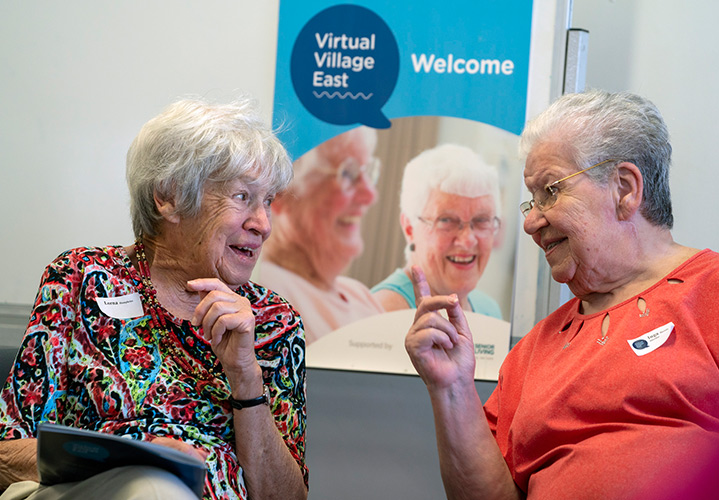
What’s a “Virtual Village”? See one in Howick!
It’s a network of friendship and support for seniors still living in the community.
HBH Senior Living has a proud history of innovation, and Virtual Village East takes that to a new level. Established in 2018 as an extension of its outreach to the local community, it’s described as “a free community service to help seniors stay socially engaged and supported”. Underpinned by the resources and expertise of HBH Senior Living, it aims to support and improve the wellbeing of seniors living independently in the community as they age.
Bonnie Robinson, Chief Executive of HBH Senior Living, explains that she became increasingly concerned about the degree of loneliness and social isolation among older people living in the community. She cites research indicating that this has a similar negative effect on health as smoking a pack of cigarettes a day. The reverse of this is a survey of HBH Senior Living’s retirement village residents which showed that being part of a community was the most valued aspect of living in the village. The virtual village concept takes that sense of community out beyond the village walls.
A year’s worth of networking and consultation with individuals and organisations within the community laid the foundation for launching Virtual Village East. Bonnie says that using the community development model meant the approach was “necessarily slow” but ensured success. Almost 300 Howick residents aged from fifty to almost ninety contributed to a survey strongly endorsing the concept of the virtual village.
The Virtual Village East model is based on five pillars of ageing well:
- My physical wellbeing
- My mental and social wellbeing
- My financial and legal wellbeing
- My support network
- My environment
Bonnie says, “Staying independent as you age isn’t about having no support, it’s about embracing support. That’s where Virtual Village East steps in – offering you regular opportunities for companionship and friendship, and connecting you to the services you need to live life your way.” To achieve this, Virtual Village East:
- holds activities and classes such as Safe and Strong exercise sessions, mindfulness classes, and information mornings on themes such as transport – average attendance at classes and activities is 45
- hosts coffee and catch-up groups in local cafes, encouraging volunteers to coordinate and lead these once they are established
- organises key events seasonally, running a summer and winter series – for example, Simple Winter Dishes, a cooking class for seniors based on their nutritional needs.
- partners with other providers of service for seniors in the community – for example, a local medical centre now screens for loneliness and recommends Virtual Village East as a “green prescription” for lonely or isolated seniors

Bonnie tells how, at the village’s initial information forum on transport, a Driving Miss Daisy franchisee shared the story of one of their clients, a woman in her early nineties, who had a number of regular weekly bookings with the service to support her busy life – Probus meetings, church, garden group, medical appointments and the hairdresser, plus a regular Friday commitment to drop her at the top of the local main shopping street. Over the next hour and a half she meandered down, dropping in on her favourite shopkeepers, doing some shopping, and stopping for a coffee in a café, then was collected and driven home from the bottom of the street. All this chauffeuring cost less on a weekly basis than the true cost of owning and maintaining a car, and kept the customer active and connected with all her special activities and people.
During Covid-19 lockdowns, the virtual village coffee groups moved to Zoom, and exercise videos and other key weblinks were sent out via regular emails. The membership database is on Infodoodle, and newsletters are mainly distributed by email. People sign up in advance for events and activities other than drop-in café catch ups; Bonnie stresses that this is essential in the current environment to enable cancelling if circumstances change.
There are currently 285 older people linked into the Virtual Village East. Some are already living in HBH Senior Living’s retirement village; the residents can participate in any of the virtual village activities, and are invited to all the virtual village events held on site, which are in addition to the activities programme run specifically for residential village residents. Bonnie notes that HBH Senior Living has essentially funded the virtual village, apart from a couple of small grants, and therefore, in effect, it is funded by retirement village sales, since like most care providers the revenue from these forms the largest part of any operating surplus. As a non-profit HBH puts any surplus into enhancing and developing all its services, including the virtual village. She also stresses it is very economical to run, relying wherever possible on volunteers, and needing only a part-time coordinator.
For other operators who may be considering a similar virtual village outreach concept, HBH Senior Living is developing a “free franchising” package – not as a money-making franchise, but in order to avoid reinventing the wheel, and to ensure the focus is on community consultation and development. Bonnie notes that within the framework they have implemented there is still plenty of opportunity for it to be adapted to each new community.
There is still more development to roll out. Covid 19 issues in Auckland have delayed two planned pilot trials: one for a “neighbour to neighbour” service where older people help each other with small tasks, the other a “trusted tradies” concept based on peer recommendations. Bonnie quotes CS Lewis: “You are never too old to set a new goal or to dream another dream”, and it’s pretty clear that she’s dreaming and goal-setting even as we talk.
Article credit: Retirement Villages Association (RVA). Written for the RVA by Janet Brown, Head and Heart Ltd
